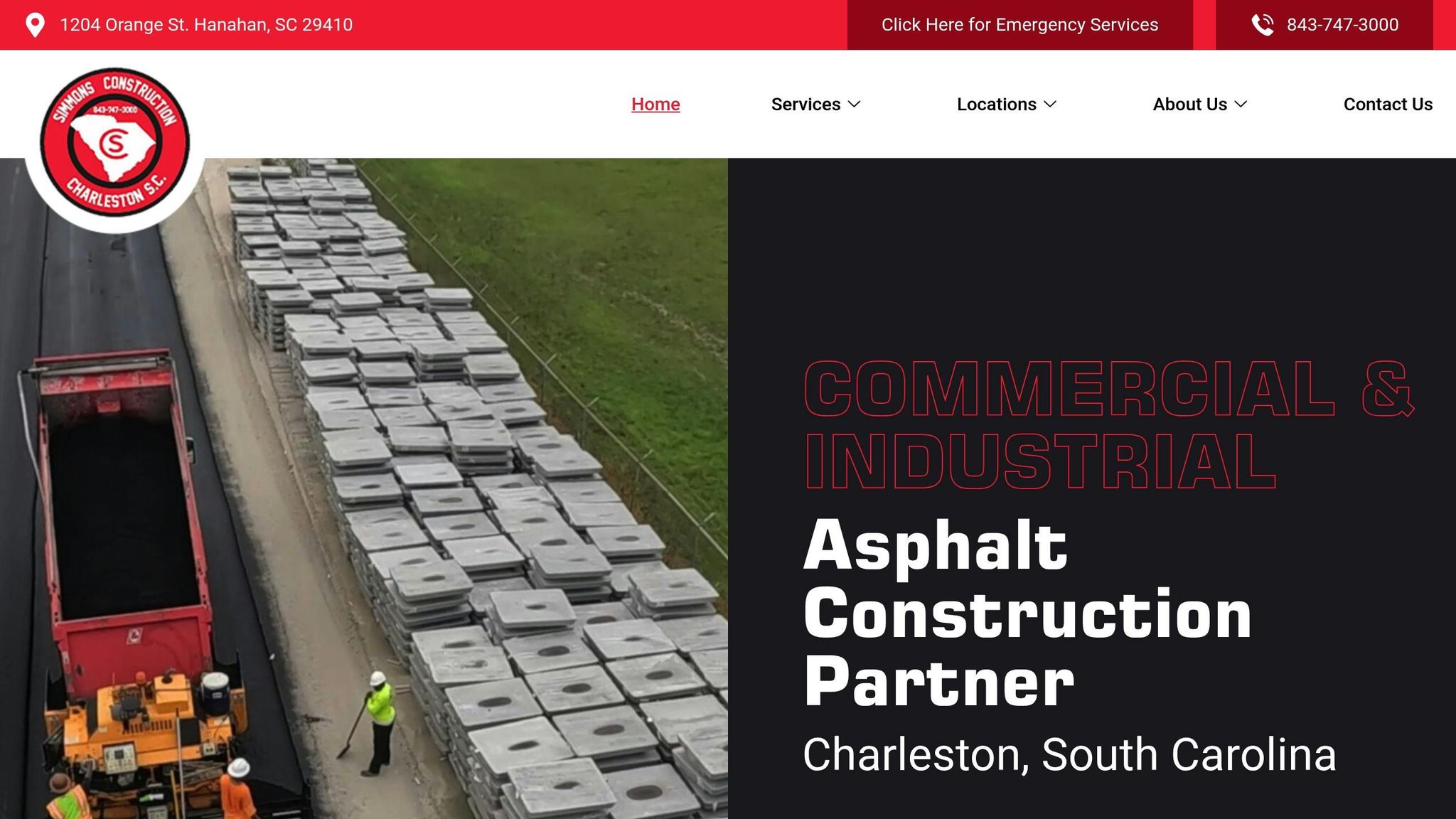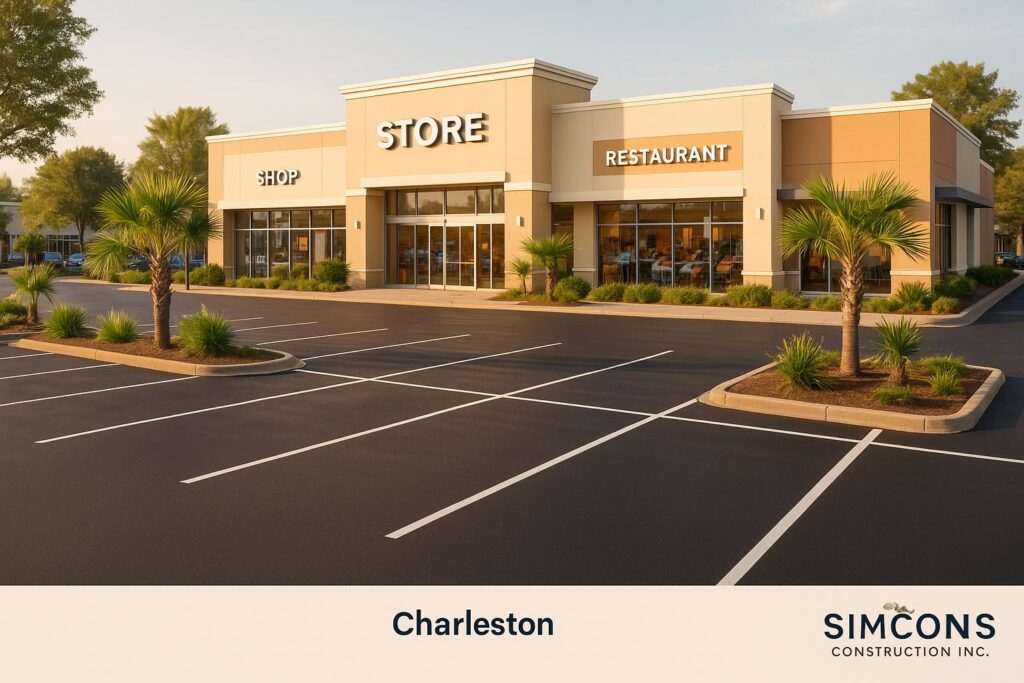Charleston‘s retail centers are prioritizing pavement upgrades in 2026 to address aging infrastructure, weather challenges, and rising traffic demands. Poor pavement conditions negatively impact customer experience, increase liability risks, and drive up maintenance costs. Upgraded surfaces improve safety, reduce long-term expenses, and enhance property value. Key factors driving this shift include:
- Weather Impact: Charleston’s coastal climate accelerates pavement wear due to humidity, rainfall, and salt-laden air.
- Traffic Growth: Increased traffic, including heavy delivery trucks, strains outdated pavement systems.
- Modern Solutions: Techniques like Hot in Place Recycling and eco-friendly materials extend pavement life and reduce costs.
- Drainage Improvements: Integrated systems prevent water damage and erosion, ensuring durability.
These upgrades align with broader infrastructure plans, such as Charleston County’s $576 million pavement improvement initiative, ensuring retail spaces remain functional and appealing. Local contractors like Simmons Construction Inc. offer tailored solutions, reducing disruptions while maximizing long-term benefits.
Main Reasons for Retail Center Pavement Upgrades
Retail centers in Charleston are upgrading their pavements to keep up with growing customer expectations and to create strong first impressions. With the city’s booming tourism and population growth, having well-maintained pavement systems plays a key role in ensuring visitors have a positive experience – starting right in the parking lot. This shift is also reflected in various redevelopment projects led by the city.
For example, in September 2024, the Charleston City Council approved a massive $300 million redevelopment plan for the former Piggly Wiggly site on Sumar Street in West Ashley. The project aims to revitalize the area into a lively community hub, complete with updated streets, sidewalks, and other amenities designed to enhance the overall customer experience through 2026.
Modern Pavement Solutions for Charleston‘s Climate
Charleston’s coastal location, humid subtropical weather, and exposure to salt air create unique challenges for paving. Simmons Construction Inc addresses these issues with specialized solutions tailored to the region’s needs. Below, we explore some of these advanced techniques.
New Asphalt Installation Methods
One innovative approach is Hot in Place Recycling, which reprocesses existing asphalt on-site and allows it to be immediately relaid without full removal. This technique not only reduces waste but also minimizes disruptions during roadwork. For example, Charleston County has scheduled a project titled "Resurfacing TST FY2025 Hot in Place Recycling" for the fourth quarter of 2025, highlighting the growing adoption of this method.
Additionally, resurfacing efforts are now prioritized in high-traffic areas, such as main entrances and fire lanes. By aligning maintenance schedules with traffic patterns and weather conditions, these projects aim to minimize inconvenience while ensuring durable results.
Recycled and Eco-Friendly Materials
Sustainability is playing an increasingly important role in modern paving. One key advancement is the use of Recycled Asphalt Pavement (RAP), which makes up as much as 30% of some asphalt mixes. This not only reduces costs but also improves resistance to the effects of seasonal temperature changes. Charleston County has already planned recycling initiatives for 2025 to integrate RAP into its paving projects.
Another innovative material is bio-based rejuvenators, which restore flexibility to aged asphalt binders. By reducing the need for new raw materials, these rejuvenators extend the life of pavement, lower maintenance costs, and allow for longer intervals between major repairs.
Combined Drainage and Erosion Solutions
Charleston’s Lowcountry geography presents unique drainage challenges, particularly for retail and commercial centers. To address this, modern paving projects incorporate integrated drainage systems that include perforated pipes, an aggregate base, and strategically placed catch basins. These systems efficiently divert stormwater, reducing erosion and protecting roadways.
A notable example is the 2026 Charleston County Rural Road Improvement Project, which aims to upgrade roads to meet county standards. Improvements include enhanced drainage features and a 22-foot travel way to better handle stormwater runoff.
Herbert Nimz, Engineering Division Manager for Charleston County, describes the regional challenges and their solutions:
"Typically, what we see in a lot of our rural roads are 12-foot travel way, essentially a single lane for cars to get in and out. No drainage at all. Essentially, the road acts as a drainage way, and we do want to improve drainage as much as possible, especially being in the Lowcountry."
Budget-Friendly Maintenance Plans for Retail Centers
Taking a proactive approach to pavement maintenance not only enhances safety but also helps avoid the hefty costs of emergency repairs. Having a scheduled maintenance plan is key to preserving pavement quality and keeping repair expenses under control.
Regular Maintenance Schedules
Studies show that asphalt pavement can last over 25 years – and even up to 30 years for driveways – when properly installed and maintained with regular preventive care. Staying ahead of wear and tear ensures the roads and parking areas in retail centers remain safe for both customers and pedestrians. Plus, addressing minor surface issues early can significantly reduce the need for expensive fixes down the line. Many local authorities have already adopted preservation-focused practices to extend pavement life and improve performance, and retail centers can take a page from their book to maximize their investment.
Planning Your Pavement Budget
Setting aside a budget for regular inspections and timely maintenance is a smart way to avoid unexpected, costly repairs. This approach is part of a larger strategy to maintain and improve retail center infrastructure. By aligning with preservation-based methods commonly used by municipalities, retail centers can ensure their pavements remain safe, efficient, and functional throughout their lifespan.
Simmons Construction Inc‘s Maintenance Services

Simmons Construction Inc offers specialized maintenance and repair services tailored to meet the needs of Charleston’s retail centers. With advanced tools and a wealth of experience, they provide 24/7 emergency support along with services like land clearing, grading, erosion control, and drainage solutions. Their comprehensive approach is specifically designed to tackle the unique challenges of Charleston’s climate, ensuring retail center pavements remain safe, long-lasting, and cost-effective over time.
sbb-itb-953c885
Calculating Returns: Financial Benefits of Pavement Upgrades
Upgraded pavement doesn’t just improve safety and functionality – it can also lead to measurable financial advantages. By investing in better pavement, property owners can make smarter infrastructure decisions that save money in both the short and long term. Let’s break down how these upgrades translate into financial benefits.
Immediate and Long-Term Savings
One of the most immediate benefits of upgraded pavement is the reduction in liability risks and repair expenses. Adding advanced drainage systems alongside new pavement can help prevent water damage, cutting down on future repair costs and minimizing flood-related risks. Additionally, safer and more reliable pavement creates a more appealing environment, which can help retain tenants and boost property value.
Lower Operational Costs Over Time
Taking a proactive stance on maintenance can significantly reduce the need for frequent and costly repairs. For example, Charleston County has been allocating funds from the 2016 Transportation Sales Tax to road improvement projects, aiming to lessen ongoing maintenance demands. These kinds of strategic investments, implemented on a broader scale, can lead to substantial savings over time by extending the lifespan of infrastructure.
Simmons Construction Inc: Helping You Get the Most from Your Investment
Simmons Construction Inc takes pavement upgrades a step further by ensuring you maximize your investment. Their approach starts with a detailed site assessment to determine the most cost-effective solutions for your property. With advanced equipment and efficient project management, they complete projects quickly while maintaining access for customers, ensuring minimal disruption to business operations and revenue streams.
Conclusion: Building Better Retail Spaces in 2026
As Charleston’s infrastructure evolves, retail centers that focus on upgrading their pavements in 2026 are setting themselves up for long-term success. These upgrades go beyond just improving appearances – they make shopping areas safer, reduce the need for constant maintenance, and create a better experience for customers, encouraging them to return.
Modern paving techniques combined with proactive maintenance offer clear financial advantages. Improved pavements not only lower maintenance costs but also enhance the overall appeal of the property. Considering Charleston’s unique weather and traffic challenges, these updates help build a stronger and more reliable infrastructure.
Partnering with local experts makes this process more efficient and effective. Local construction professionals bring a deep understanding of the area’s specific needs, from coastal weather conditions to soil characteristics. This insight leads to faster project completion, better resource allocation, and cost savings. Their expertise ensures projects are tailored to Charleston’s environment, delivering durable and lasting results.
Simmons Construction Inc stands out as a trusted partner for retail centers. With advanced equipment, streamlined project management, and extensive local knowledge, they minimize disruptions while maximizing returns on investment. Their approach ensures that retail spaces are ready to thrive in 2026.
FAQs
What are the benefits of using Hot in Place Recycling for paving upgrades at Charleston retail centers?
Hot in Place Recycling (HIR) is a smart choice for retail centers in Charleston aiming to refresh their pavement without breaking the bank. This method works by recycling the existing asphalt right on-site, which means less need for new materials and lower transportation expenses. Plus, the process is quicker, helping businesses avoid lengthy disruptions that could impact customer flow.
Beyond the cost and time savings, HIR is a greener option. By reusing materials already in place, it cuts down on waste and preserves natural resources. The result? A durable, smoother pavement that not only boosts safety but also enhances the overall experience for customers visiting the retail center.
How do modern drainage systems in paving projects protect Charleston retail centers from weather-related damage?
Modern drainage systems are essential for safeguarding retail center pavements in Charleston, a city often hit by heavy rain and storms. These systems are built to efficiently direct water away, reducing the chances of pooling and protecting the pavement from water damage that can lead to long-term deterioration.
By using advanced drainage solutions, retail centers can extend the lifespan of their parking lots and walkways, cut down on maintenance expenses, and provide safer spaces for customers. This is especially critical in Charleston’s Lowcountry climate, where managing water effectively is key to maintaining infrastructure over time.
What are the financial benefits of upgrading pavement and maintaining it proactively for retail centers?
Upgrading pavement and setting up regular maintenance plans can be a smart financial move for retail center owners. When parking lots and walkways are in great shape, they create a safer and more inviting space for customers. This can lead to increased foot traffic and, ultimately, higher sales.
On top of that, staying on top of maintenance helps avoid expensive repairs that come from neglect or natural wear and tear. Putting money into these improvements now can save on future costs, boost property value, and improve overall returns. Plus, well-kept infrastructure reduces liability risks, which can mean even more savings for owners.


